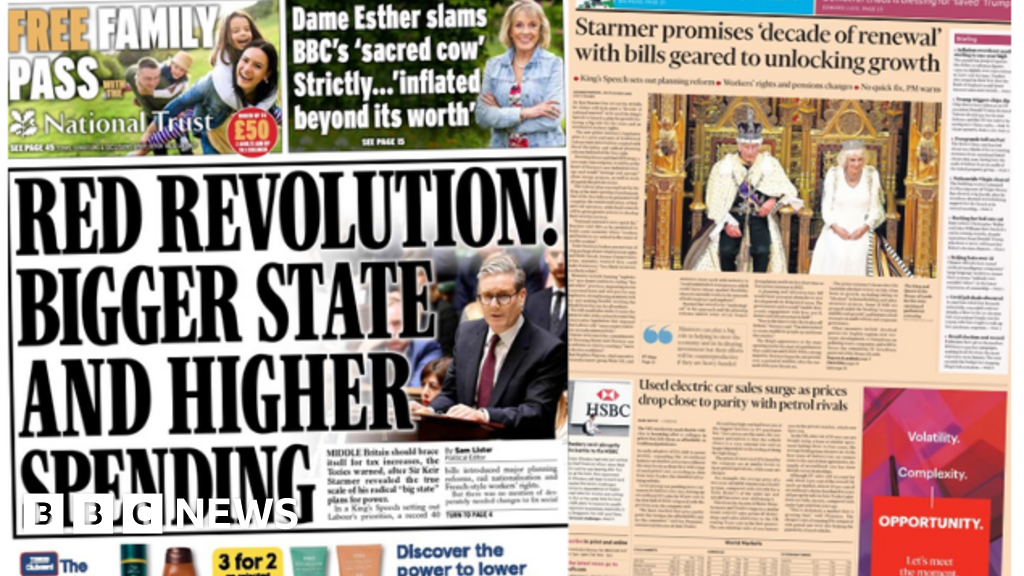The King, the Queen and Sir Keir Starmer all compete for space on the front pages, as the papers give their verdicts on the King’s Speech.
The Daily Telegraph says the bills set out signalled “the return of big government”, with promises to nationalise the railways and give extra rights to workers and tenants.
The Daily Express headline calls it a “Red Revolution”, and warns middle England to “brace itself” for tax increases, while the Daily Mail says new measures on workers’ rights will cost jobs. It asks: “How will these new burdens on firms help growth?”
The Financial Times also says that some business leaders are nervous of a big package of new employment rights. But, overall, it describes the legislative plan as “a pick-and-mix of traditional Labour state intervention, coupled with fiscal discipline and radical planning reforms beloved of the Tory right”.
The Sun calls it a good start, but wants to see if the plans “bear fruit”. The Daily Mirror thinks the speech offered a “blueprint to restore the nation’s hopes”.
The Guardian highlights the announcement of a government taskforce to tackle child poverty, saying the prime minister is trying to ward off a rebellion by his backbenchers over the issue of the benefit cap. The paper says dozens of Labour MPs were angered by the lack of any specific measures, and it reports that left-wingers are poised to back amendments which are being put forward.
The Times, while it puts the King and Queen on its front page, focuses instead on the government’s moves towards a new deal with the EU on migrants. It says Sir Keir Starmer will try to “reset” Britain’s relationship with Europe when he hosts a summit in Oxfordshire this morning.
And women are leaving it too late to have babies, according to another headline on the front of The Times. It quotes a report by the fertility regulator, the HFEA, which says women are jeopardising their chances of success with IVF treatment by waiting too long. It says the average age of those starting treatment has passed 35 for the first time. The paper says the trend has been blamed on poor access to NHS services, the cost of living, and pandemic lockdowns making it difficult to find a partner.
The King, the Queen and Sir Keir Starmer all compete for space on the front pages, as the papers give their verdicts on the King’s Speech.
The Daily Telegraph says the bills set out signalled “the return of big government”, with promises to nationalise the railways and give extra rights to workers and tenants.
The Daily Express headline calls it a Red Revolution, and warns middle England to “brace itself” for tax increases, while the Daily Mail says new measures on workers’ rights will cost jobs. It asks: “How will these new burdens on firms help growth?”
The Financial Times also says that some business leaders are nervous of a big package of new employment rights. But, overall, it describes the legislative plan as “a pick-and-mix of traditional Labour state intervention, coupled with fiscal discipline and radical planning reforms beloved of the Tory right”.
The Sun calls it a good start, but wants to see if the plans “bear fruit”. The Daily Mirror thinks the speech offered a “blueprint to restore the nation’s hopes”.
The Guardian highlights the announcement of a government taskforce to tackle child poverty, saying the prime minister is trying to ward off a rebellion by his backbenchers over the issue of the benefit cap. The paper says dozens of Labour MPs were angered by the lack of any specific measures, and it reports that leftwingers are poised to back amendments which are being put forward.
The Times, while it puts the King and Queen on its front page, focuses instead on the government’s moves towards a new deal with the EU on migrants. It says Sir Keir Starmer will try to “reset” Britain’s relationship with Europe when he hosts a summit in Oxfordshire this morning.
And Women are leaving it too late to have babies, according to another headline on the front of The Times. It quotes a report by the fertility regulator, the HFEA, which says women are jeopardising their chances of success with IVF treatment by waiting too long. It says the average age of those starting treatment has passed 35 for the first time. The paper says the trend has been blamed on poor access to NHS services, the cost of living, and pandemic lockdowns making it difficult to find a partner.
#Newspaper #headlines #Starmers #red #revolution #promises #renewal,
#Newspaper #headlines #Starmers #red #revolution #promises #renewal
